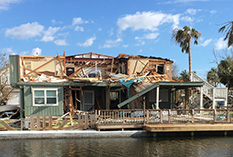Research Spearheaded by UMD Receives NSF RAPID Support
The National Science Foundation (NSF) has awarded a Grant for Rapid Response Research (RAPID) to support a preliminary effort spearheaded by University of Maryland’s Richard Krupar III to better understand the relationship between the hazards of Hurricane Harvey and observed residential building damage. Krupar will serve as a co-principal investigator on the year-long project along with lead principal investigator David Roueche from Auburn University and co-principal investigator Frank Lombardo from the University of Illinois at Urbana-Champaign. The roughly $40,000 RAPID project continues research began in the days immediately following Hurricane Harvey’s landfall in Texas. The initial reconnaissance revealed that similar residential buildings exposed to the brunt of Harvey’s wind and storm surges sustained varying levels of damage, suggesting gaps in the field’s knowledge of the relationship between hurricane hazards and residential building performance. Their findings could advance the design of hurricane-resistant structures through the development of better residential building damage models. Over the next year, Roueche, Lombardo, and Krupar will develop a method engineers and scientists could use to anticipate the level of damage a residential building will sustain if hit by speeds from different regions of the hurricane wind field and understand how this damage compares to tornado-induced damage. The team will also establish a framework for evaluating how storm surge and combined hazards affect residential buildings. Both the method and framework will be grounded in a database of single-family residential building damage assessments collected by the research team and graduate students working with them. The database will be hosted on DesignSafe—a new cloud-based NSF research platform that enables better data sharing and collating. "The value of this research extends beyond what it will reveal for the scientific community today," said Krupar, a postdoctoral associate with the Department of Fire Protection Engineering and the Center for Disaster Resilience in the Department of Civil and Environmental Engineering. "It's results can also be used to educate the next generation of multi-hazard engineers on the impacts of hurricanes on the built environment."
Related Articles: September 26, 2017 Prev Next |


